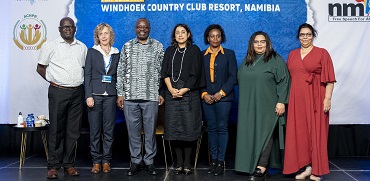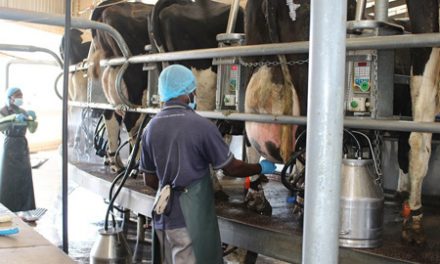
Information and Communication Rights in Africa are critical: Mushelenga

Over 80 information and communication rights advocates, media professionals, and academics from across Africa adopted a forward-looking declaration, articulating the roadmap to be considered towards advancing information and communication rights in Africa.
This was at the end of a Regional Conference on Information and Communication Rights in Africa, held in Windhoek from 31 May to 2 June.
The conference was co-hosted by Fesmedia Africa and the Special Rapporteur on Freedom of Expression and Access to Information in Africa, in the African Commission on Human and Peoples’ Rights (ACHPR), in partnership with UNESCO Windhoek Office and the Namibia Media Trust (NMT).
The objective of the conference was to deliberate on matters and challenges affecting access to information, freedom of expression, and digital rights in Africa; to exchange strategies and learnings in developing the policies and practices that give practical effect to the rights to information, expression and a free and independent media, as well as to frame the regional investment, development, and advocacy agenda required to advance the comprehensive elaboration of information and communications rights in Africa.
The Minister of Information and Communication Technology, Hon. Dr. Peya Mushelenga, in a keynote address, highlighted that Information and Communication Rights in Africa, are critical due to the advancement of digital and information and communication technologies.
He further underscored the commitment of the government to promoting and protecting information and communication rights.
“The Parliament of Namibia passed the Access to Information Bill, signed into law by HE Dr. Hage Geingob, in December 2022. This significant development further demonstrated the commitment of the government to promote Access to Information as a human right that every Namibian must enjoy” he said.
Setting the tone for the conference discussions, Freya Gruenhagen, Resident Representative of the Friedrich Ebert Stiftung in Namibia and Fesmedia Africa Director said “The advancement of digital information and communication technologies has opened new opportunities for access to information and political expression. Additionally, however, it has also posed profound challenges to democratic processes, social cohesion, and even peace in Africa.”
She stressed that FES and its partners are bound together in the firm belief in the importance of inclusive dialogue for democratic processes.
At the heart of the declaration was the sincere commitment expressed by the delegates to advance information and communication rights in Africa. Four thematic areas namely digital rights, access to information, data protection, as well as media diversity and viability, were identified for joint engagement by all relevant stakeholders including state parties, intergovernmental organisations, and civil society to promote the full realisation of these rights in Africa.
Presenting the declaration, the Director of Namibia Media Trust, Zoe Titus said the declaration recognises the profound influence of information and communication technologies (ICTs) and the urgent need to guarantee equitable access to information as a necessary condition for the full exercise and enjoyment of the right to freedom of expression, and as a catalyst for inclusive growth, sustainable development, and transparent governance.
Titus, therefore, called on the United Nations Educational, Scientific and Cultural Organisations; the African Commission for Human and Peoples’ Rights; African governments; online platforms and the private sector; civil society organisations, as well as media organisations as key stakeholders to advance information and communication rights in Africa.
 Henry Maina, Freya Gruenhagen, Mr Gilbert Sendugwa, Hon. Commissioner Ourveena Geeresha Topsy Sanoo, Lydia Gachungi, Zoe Titus and Reyhana Masters.
Henry Maina, Freya Gruenhagen, Mr Gilbert Sendugwa, Hon. Commissioner Ourveena Geeresha Topsy Sanoo, Lydia Gachungi, Zoe Titus and Reyhana Masters.











































